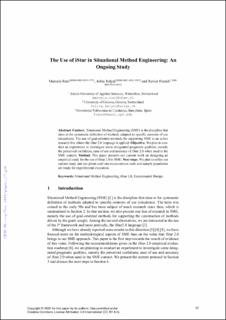Bitte benutzen Sie diese Kennung, um auf die Ressource zu verweisen:
https://doi.org/10.21256/zhaw-24495| Publikationstyp: | Konferenz: Paper |
| Art der Begutachtung: | Peer review (Abstract) |
| Titel: | The use of iStar in Situational Method Engineering : an ongoing study |
| Autor/-in: | Ruiz, Marcela Ralyté, Jolita Franch, Xavier |
| et. al: | No |
| DOI: | 10.21256/zhaw-24495 |
| Tagungsband: | Thirteenth International iStar Workshop |
| Herausgeber/-in des übergeordneten Werkes: | Guizzardi, Renata Mussbacher, Gunter Ruiz, Marcela |
| Seite(n): | 37 |
| Seiten bis: | 42 |
| Angaben zur Konferenz: | 28th IEEE International Requirements Engineering Conference (RE 2020), Zurich, Switzerland, 31 August - 4 September 2020 |
| Erscheinungsdatum: | Aug-2020 |
| Reihe: | CEUR Workshop Proceedings |
| Reihenzählung: | 2641 |
| Verlag / Hrsg. Institution: | CEUR Workshop Proceedings |
| ISSN: | 1613-0073 |
| Andere Identifier: | urn:nbn:de:0074-2641-0 |
| Sprache: | Englisch |
| Schlagwörter: | Situational Method Engineering; iStar 2.0; Experimental design |
| Fachgebiet (DDC): | 005: Computerprogrammierung, Programme und Daten |
| Zusammenfassung: | Context. Situational Method Engineering (SME) is the discipline that aims at the systematic definition of methods adapted to specific contexts of use (situations). The use of goal-oriented methods for supporting SME is an active research line where the iStar 2.0 language is applied. Objective. We plan to conduct an experiment to investigate some designated pragmatic qualities, namely the perceived usefulness, ease of use and accuracy of iStar 2.0 when used in the SME context. Method. This paper presents our current work on designing an empirical study for the use of iStar 2.0 in SME. Next steps. We plan to refine our current study and run pilots until our measurement tools and sample population are ready for experimental execution. |
| URI: | https://digitalcollection.zhaw.ch/handle/11475/24495 |
| Volltext Version: | Publizierte Version |
| Lizenz (gemäss Verlagsvertrag): | CC BY 4.0: Namensnennung 4.0 International |
| Departement: | School of Engineering |
| Organisationseinheit: | Institut für Informatik (InIT) |
| Publiziert im Rahmen des ZHAW-Projekts: | Can virtual reality systems help us to design software as we talk? |
| Enthalten in den Sammlungen: | Publikationen School of Engineering |
Dateien zu dieser Ressource:
| Datei | Beschreibung | Größe | Format | |
|---|---|---|---|---|
| 2020_Ruiz-etal_iStar-use-in-Situational-Method-Engineering.pdf | 1.96 MB | Adobe PDF |  Öffnen/Anzeigen |
Zur Langanzeige
Ruiz, M., Ralyté, J., & Franch, X. (2020). The use of iStar in Situational Method Engineering : an ongoing study [Conference paper]. In R. Guizzardi, G. Mussbacher, & M. Ruiz (Eds.), Thirteenth International iStar Workshop (pp. 37–42). CEUR Workshop Proceedings. https://doi.org/10.21256/zhaw-24495
Ruiz, M., Ralyté, J. and Franch, X. (2020) ‘The use of iStar in Situational Method Engineering : an ongoing study’, in R. Guizzardi, G. Mussbacher, and M. Ruiz (eds) Thirteenth International iStar Workshop. CEUR Workshop Proceedings, pp. 37–42. Available at: https://doi.org/10.21256/zhaw-24495.
M. Ruiz, J. Ralyté, and X. Franch, “The use of iStar in Situational Method Engineering : an ongoing study,” in Thirteenth International iStar Workshop, Aug. 2020, pp. 37–42. doi: 10.21256/zhaw-24495.
RUIZ, Marcela, Jolita RALYTÉ und Xavier FRANCH, 2020. The use of iStar in Situational Method Engineering : an ongoing study. In: Renata GUIZZARDI, Gunter MUSSBACHER und Marcela RUIZ (Hrsg.), Thirteenth International iStar Workshop. Conference paper. CEUR Workshop Proceedings. August 2020. S. 37–42
Ruiz, Marcela, Jolita Ralyté, and Xavier Franch. 2020. “The Use of iStar in Situational Method Engineering : An Ongoing Study.” Conference paper. In Thirteenth International iStar Workshop, edited by Renata Guizzardi, Gunter Mussbacher, and Marcela Ruiz, 37–42. CEUR Workshop Proceedings. https://doi.org/10.21256/zhaw-24495.
Ruiz, Marcela, et al. “The Use of iStar in Situational Method Engineering : An Ongoing Study.” Thirteenth International iStar Workshop, edited by Renata Guizzardi et al., CEUR Workshop Proceedings, 2020, pp. 37–42, https://doi.org/10.21256/zhaw-24495.
Alle Ressourcen in diesem Repository sind urheberrechtlich geschützt, soweit nicht anderweitig angezeigt.